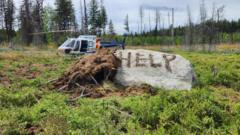How Did a Canadian Man Survive 9 Days in the Wilderness with Just Pond Water?

A Miraculous Survival: The Story of Andrew Barber in British Columbia's Wilderness
In a remarkable tale of survival, Andrew Barber, a 39-year-old man, was found after being missing for over a week in the rugged wilderness of British Columbia, Canada. His story is not just one of desperation but also of human resilience and the instinct to survive against all odds. The details of his ordeal highlight the challenges of survival in the wild, the importance of search and rescue operations, and the sheer willpower of an individual facing dire circumstances.
The Beginning of a Harrowing Journey
Andrew Barber was reported missing on July 31, near McLeese Lake, located approximately 365 miles (587 km) north of Vancouver. His journey took a perilous turn when his truck broke down, leaving him stranded in an expansive and unforgiving wilderness. The remote area is characterized by dense forests, rugged terrain, and limited access, which significantly complicated the search efforts.
Desperate Times Call for Desperate Measures
As the days passed, Andrew faced daunting challenges. Severely dehydrated and dealing with a leg injury, he had to rely on his instincts and survival skills. Faced with limited resources, he used various tactics to survive, including:
- Building a makeshift shelter from sticks and mud
- Finding and drinking pond water, despite its unclean state
- Foraging for whatever food he could find in the wild
The Call for Help
In a poignant display of his desperate situation, Andrew etched the word "help" into a rock and drew "SOS" in the mud near his shelter. These signs of distress were crucial in guiding the search teams toward his location. Despite the challenges he faced, Andrew's resourcefulness and determination to survive shone through during his ordeal.
The Search Operation
The search for Andrew Barber involved extensive efforts from the Royal Canadian Mounted Police (RCMP) and local volunteer groups. With the help of technology, including helicopters, search teams combed through the vast wilderness. Their efforts were tireless, involving countless hours spent on the ground and in the air. The breakthrough came when a police helicopter spotted Andrew's truck parked on a forest road, which helped narrow down the search area significantly.
The Moment of Rescue
On August 8, after nine long days, Andrew was finally located near his makeshift shelter by the Quesnel Search & Rescue team. The moment of rescue was a relief not just for Andrew but also for the teams that had worked tirelessly to find him. Staff Sgt. Brad McKinnon of the Williams Lake RCMP reported that Andrew was doing "quite well" considering the circumstances he had endured.
Aftermath of the Ordeal
Upon being found, Andrew was transported to a hospital for treatment. He was released shortly thereafter, which was a testament to his survival skills and the effectiveness of the search and rescue operation. Bob Zimmerman, president of Quesnel Search and Rescue, expressed that Andrew's survival was miraculous, noting that he might not have made it another 24 hours without being rescued. This underscores the critical nature of timely rescue operations in wilderness survival situations.
Survival Skills: What Can We Learn from Andrew Barber's Experience?
Andrew's story is not just a harrowing account of survival; it serves as a valuable lesson for anyone who finds themselves in a similar predicament. Here are some essential survival skills that can make a difference:
- Building Shelter: Creating a shelter is crucial to protect yourself from the elements. Use available materials like branches, leaves, and mud to create a barrier against wind and rain.
- Finding Water: Clean drinking water is essential for survival. In the absence of clean sources, be prepared to purify water when possible, such as boiling or using water purification tablets.
- Foraging for Food: Understanding which plants and animals are safe to consume can provide sustenance during a survival situation. Familiarize yourself with local flora and fauna before venturing into the wilderness.
- Signaling for Help: Making your location known is vital. Use visible symbols like "SOS" or "HELP" on rocks or the ground to attract the attention of search teams.
- Staying Calm: Maintaining a level head can significantly impact your chances of survival. Panic can lead to poor decision-making, while calmness allows for better planning and execution of survival tactics.
Preparing for Wilderness Adventures
For those who love outdoor adventures, preparation is key. Here are some steps to ensure safety while exploring wilderness areas:
- Research Your Destination: Know the terrain, weather conditions, and potential hazards of the area you plan to visit.
- Pack Essential Gear: Always carry a first-aid kit, adequate water supplies, signaling devices, and tools for building shelter.
- Inform Someone of Your Plans: Always let someone know your itinerary and expected return time. This allows for timely search efforts if something goes awry.
- Learn Basic Survival Skills: Take courses on wilderness survival to gain practical knowledge and skills that can be lifesaving.
Frequently Asked Questions
What should I do if I get lost in the wilderness?
If you find yourself lost, the first step is to stay calm. Try to retrace your steps if it's safe to do so. If not, find a secure location, set up a shelter, and signal for help.
How can I purify water in the wild?
Water can be purified by boiling it for at least one minute, using purification tablets, or filtering it through a cloth or other barriers to remove sediments.
What food can I safely forage in the wild?
Common edible plants include dandelions, clover, and wild berries. However, it’s critical to have knowledge of local flora, as some plants can be toxic.
Conclusion: Resilience in the Face of Adversity
The story of Andrew Barber exemplifies the resilience of the human spirit. His experience serves as a reminder of the importance of preparation, knowledge, and the vital role of search and rescue teams in wilderness survival. As outdoor enthusiasts, we can learn from Andrew’s ordeal and equip ourselves with the skills necessary to thrive in nature's vastness. Remember, whether you are an experienced adventurer or a novice, preparation is key to enjoying the wilderness safely.
Have you ever thought about how you would react in a survival situation? What skills do you think are most essential? #SurvivalSkills #WildernessAdventure #EmergencyPreparedness
Published: 2025-08-11 14:49:06 | Category: technology



